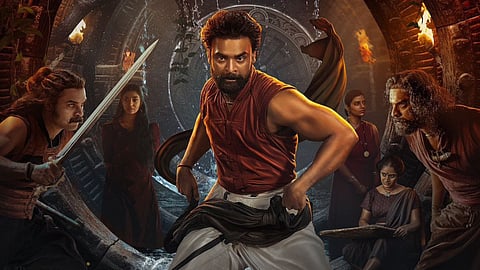ARM review: Tovino Thomas safely shoulders Jithin Laal’s inventive debut
ARM(3 / 5)
In Timon of Athens, William Shakespeare explores thievery as a subjective idea. The protagonist says the sun steals from the sea, the sea steals from the moon, and the moon steals from the sun, but all the laws have failed to prevent them. Jithin Laal’s directorial debut Ajayante Randam Moshanam (ARM) subverts this idea. ARM uses thievery to narrate an inventive ballad on how little it takes for the oppressed to be labelled thieves when they fight for their rights.
The story, written by debutant Sujith Nambiar, parallels the varna caste system and how it shifts shape from one generation to another. It begins slowly, with a bedtime tale that reveals the belief system of Haripuram, a sectarian village in northern Kerala. The grandmother, who belongs to a dominant caste, narrates to her granddaughter the story of Kunjikelu—an army general to the king–who brought a revered lamp to the village and became celebrated as a hero. Then there is Maniyan, a descendant of Kunjikelu, who steals from the dominant castes. But at the centre of the story is Ajayan, subjected to harassment for the actions of his predecessors, and no fault of his own.
What makes this approach compelling is the director's adept fusion of different genres and how it capitalises on the relatability Tovino Thomas has built with his audience. Tovino embodies three distinct characters—Kunjikelu, Maniyan, and MV Ajayan—across different timelines, and he remains convincing in each role, exuding a sense of familiarity. For instance, flashes of his clean-moustached character from Kalki surface in Kunjikelu, elements of Minnal Murali and Kala in Maniyan, and touches of Maathan from Maayanadhi, Dasan from Godha, and Bineesh from Theevandi in Ajayan.
The result is a captivating fusion that combines the exhilarating escapades of Pirates of the Caribbean, the thrilling adventures in the Indiana Jones films, and the intricate mysteries of the Sherlock Holmes series. The film’s agnostic view on life becomes evident when the three characters are juxtaposed and presented as a single idea.
In a film that depicts a good amount of caste violence, the constant reinforcement of anti-caste ideals through humorous digs, action sequences, and folk songs elevates ARM in a huge way. The presence of Bijukuttan, Basil Joseph, and Aju Varghese make sure the film does not fall into the trap of trauma porn. Another admirable factor is the use of 3D, which keeps us on-the-edge-of-the-seat in high stakes scenes.
However, ARM falls short of its full potential from a disjointed and inconsistent screenplay. Although romance is a central theme, the characters played by Aishwarya Rajesh, Surabhi Lakshmi, and Krithi Shetty lack meaningful connections. It’s not just the women, even Harish Uthaman, whose character promises some menace, fizzles out by the end of the movie.
In one of the crucial scenes, the use of magical realism feels forced and a lazy route to conclude the plot. Even the voice of the cosmic creator, that of Mohanlal in Malayalam, fails to make an impact.
However, Jomon T John’s cinematography and Dhibu Ninan Thomas’s music bring a visceral intensity that somewhat compensates for these deficiencies.
Disclaimer: This review was not paid for or commissioned by anyone associated with the film. Neither TNM nor any of its reviewers have any sort of business relationship with the film’s producers or any other members of its cast and crew.

